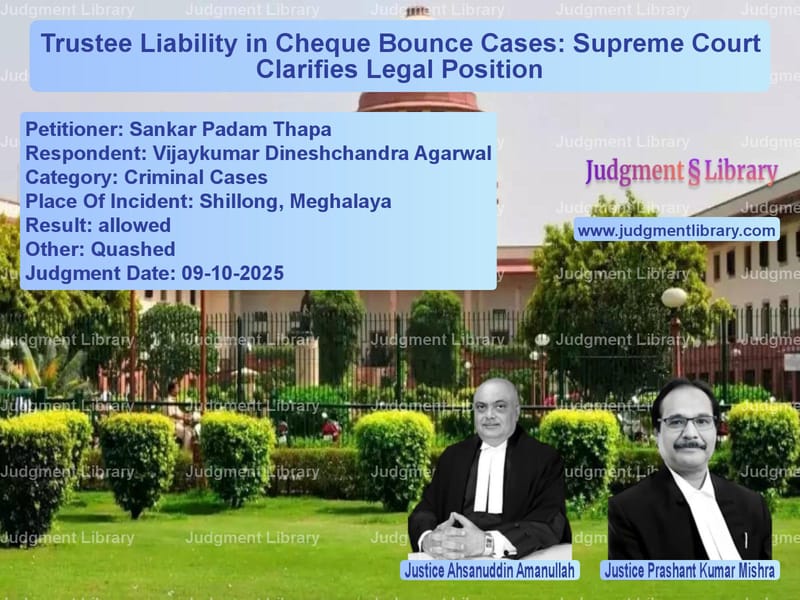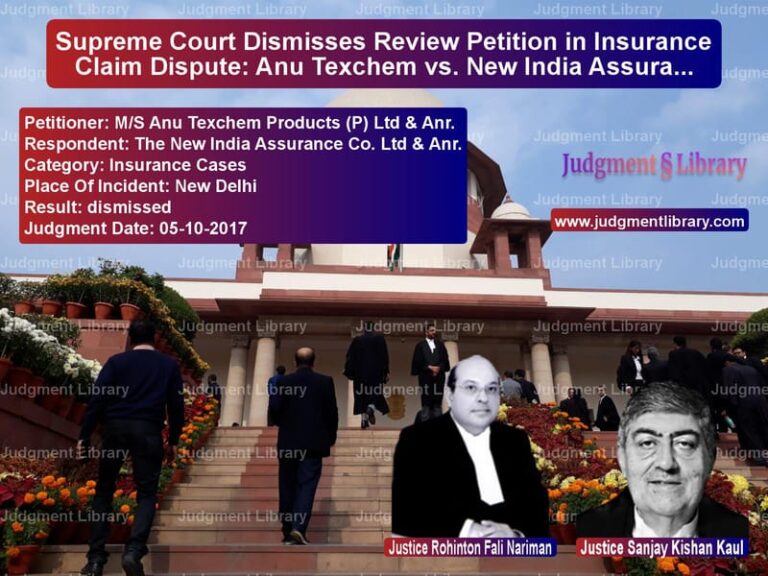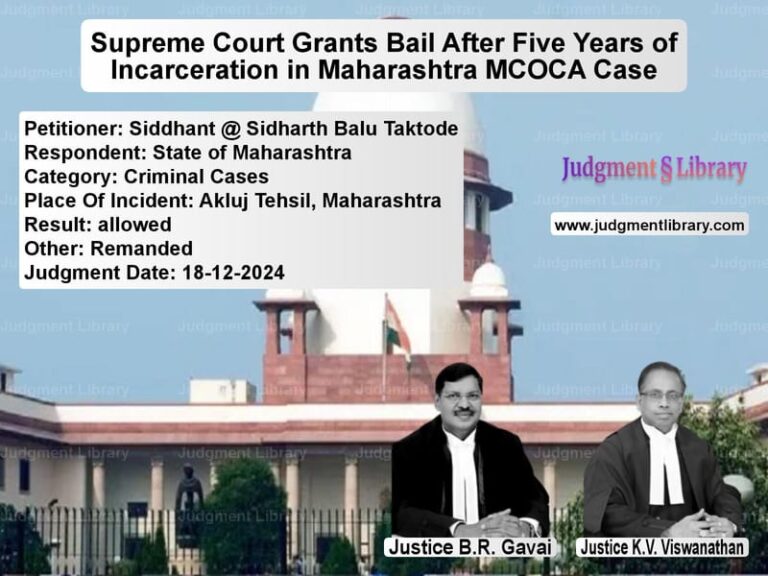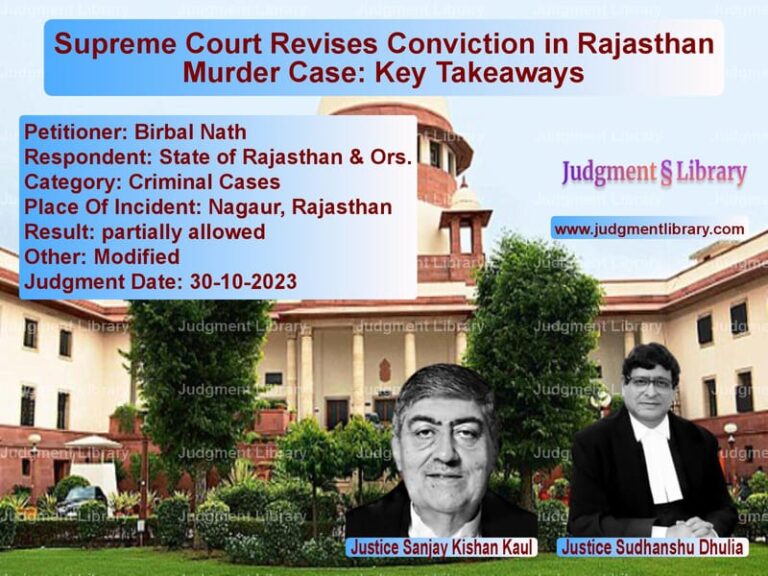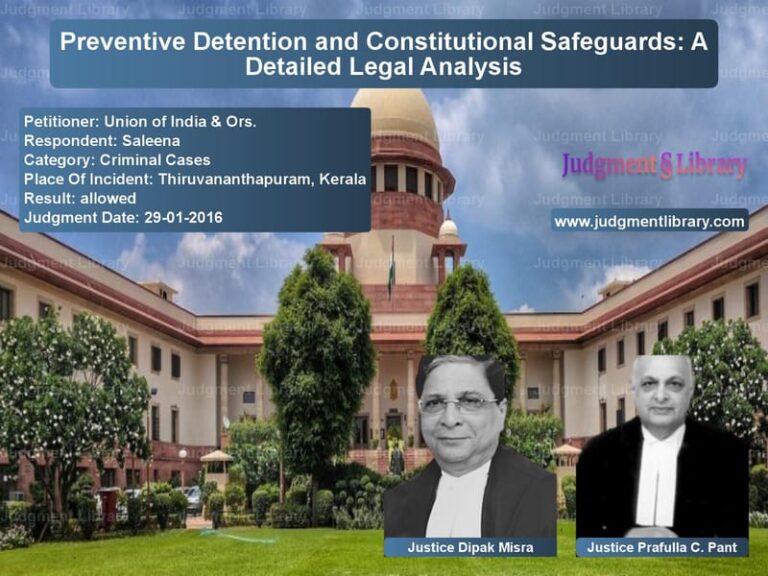Trustee Liability in Cheque Bounce Cases: Supreme Court Clarifies Legal Position
In a significant ruling that clarifies the legal position regarding trustee liability in cheque dishonour cases, the Supreme Court of India has delivered a judgment that will have far-reaching implications for trusts and their operations across the country. The case revolved around a fundamental question that has troubled lower courts for years: when a cheque issued on behalf of a trust gets dishonoured, is it necessary to make the trust itself an accused in the complaint, or can legal proceedings be initiated directly against the trustee who signed the cheque?
The dispute began with a financial arrangement between Sankar Padam Thapa and Vijaykumar Dineshchandra Agarwal, the Chairman of Orion Education Trust. The trust had taken over the management of William Carey University, which was facing severe financial difficulties. As part of this transition, the appellant was entrusted with liaisoning with governmental authorities and facilitating the administrative transfer. For services rendered, the respondent issued a cheque for Rs. 5 crores dated October 13, 2018, drawn on Kotak Mahindra Bank, Vadodara Branch.
However, when the appellant presented the cheque at his ICICI Bank branch in Shillong on December 7, 2018, it was dishonoured with the endorsement ‘insufficient funds’. Following the statutory procedure, the appellant issued a notice under Section 138 of the Negotiable Instruments Act on December 19, 2018, which was received by the respondent on December 27, 2018. After the respondent’s reply on December 28, 2018, the appellant filed a complaint case before the Judicial Magistrate, Shillong, against the respondent for offences under Sections 138 and 142 of the NI Act as well as Section 420 of the Indian Penal Code.
The Legal Challenge
The respondent challenged the complaint’s maintainability before the Meghalaya High Court, arguing that since Orion Trust – a juristic entity and necessary party – had not been added as a party, the complaint was not maintainable, and consequently, no vicarious liability could be placed on him as Chairman. The High Court agreed with this contention and quashed the proceedings and summoning order dated February 11, 2019. This led the appellant to approach the Supreme Court, setting the stage for this important legal clarification.
The Appellant’s Arguments
The appellant’s counsel presented two main arguments before the Supreme Court. First, they contended that a trust is not eligible to be sued, and second, that there was no mandate to make specific averments regarding the accused’s responsibility in conducting the day-to-day business of the trust.
To support the first proposition, the appellant relied heavily on the Supreme Court’s decision in Pratibha Pratisthan v Manager, Canara Bank, where it was held that a trust is not a ‘person’ and therefore could not be a consumer under the Consumer Protection Act. The appellant also cited multiple High Court decisions, including K P Shibu v State of Kerala from the Kerala High Court, which held that “a Trust is not a juristic person or a legal entity, as a juristic person has a legal existence of its own and hence is capable of suing and being sued in a court of law.”
The appellant’s counsel submitted that “a Trust, as defined under the Indian Trusts Act, 1882, is an obligation and not a legal entity.” They argued that the obligation to ‘maintain and defend’ suits is placed on trustees, not the trust itself.
For the second limb of their argument, the appellant relied on SMS Pharmaceuticals Ltd. v Neeta Bhalla, where the Supreme Court held that “a position of a Managing Director would suggest responsibility of the person holding the said position, in the day-to-day affairs of the Company.” The appellant argued that this position is akin to that of the Chairman/Authorized Representative of a trust.
The Respondent’s Counter-Arguments
The respondent, through senior counsel, argued exactly the opposite – that a trust is indeed a juristic person capable of suing and being sued in a court of law. They relied on Prana Educational and Charitable Trust v State of Kerala, where the Kerala High Court held that “the expression ‘company’ used in sub-clause (a) of the Explanation to Section 141 of the NI Act includes ‘any body corporate’ or ‘other association of individuals’, and the said term, by applying the principle of ejusdem generis would include a club, a Trust, and a Hindu Undivided Family within the expression ‘company’ or ‘firm’.”
The respondent also cited decisions from the Bombay High Court in Dadasaheb Rawal Co-op. Bank of Dondaicha Ltd. v Ramesh s/o Jawrilal Jain and Mukund s/o Manohar Wazalwar v Eknath s/o Bajirao Hatwar, as well as the Orissa High Court in Bijaya Manjari Satpathy v State of Orissa, all supporting the position that a trust is a juristic person liable for prosecution under Section 138 of the NI Act.
The Supreme Court’s Analysis and Reasoning
The Supreme Court, after hearing both parties and examining the legal framework, delivered a comprehensive judgment that addressed both the specific case and the broader legal principles involved.
The Court began by reiterating the established position from SMS Pharmaceuticals Ltd. and K K Ahuja v V K Vora that “a person designated as ‘Managing Director’ or ‘Joint Managing Director’, by virtue of the office held, would be in charge of and responsible for the daily conduct or business of the company, and thus, be covered under Section 141 of the NI Act. Further, as far as the signatory of a cheque which is dishonoured be concerned, he is responsible for the incriminating act and will be covered under Section 141 of the NI Act.”
The Court then delved into the core issue of whether a trust can sue or be sued. Examining Sections 3 and 13 of the Indian Trusts Act, 1882, the Court noted that “the obligation to ‘maintain and defend’ suits is placed on the shoulders of a Trustee and not the Trust itself. It is clear that only a Trustee has the obligation to file, maintain and defend any suit on behalf of the Trust. Meaning thereby, that a Trust does not have a separate legal existence of its own, making it incapable of suing or being sued.”
The Court endorsed the reasoning from K P Shibu, where the Kerala High Court had observed: “Thus, it appears that the ‘Trust’ is not capable of suing and being sued in a court of law, even though the trustees can maintain and defend suits for the preservation and protection of the trust-property. Therefore, a ‘Trust’ is not a juristic person or a legal entity, as the juristic person has a legal existence of its own and hence it is capable of suing and being sued in a court of law.”
The Supreme Court firmly stated: “We find substance in the reasoning assigned by the High Courts of Kerala, Delhi, Madras, Gujarat, Calcutta and Karnataka that a Trust is not a ‘legal entity’ or ‘juristic person’. A Trust is also not like a corporation which has a legal existence of its own and therefore can appoint an agent. A Trust operates through its Trustees, who are legal entities.”
The Court further elaborated: “Ergo, it is clear that though a Trust may act or even be treated as an entity for certain legal purposes and not all legal purposes, a Trust is an obligation imposed on the ostensible owner of the property to use the same for a particular object – for the benefit of a named beneficiary or charity, and it is the Trustee(s) who are bound to maintain and defend all suits.”
Addressing the specific question before it, the Court unequivocally held: “There exists no ambiguity about there being no legal requirement for a Trust to be made a party in a proceeding before a Court of Law since it is only a/the Trustee(s) who are liable and answerable for acts done or alleged to have been done for and on behalf of the said Trust.”
Overruling Contrary Precedents
The Supreme Court specifically addressed and overruled several High Court decisions that had taken a contrary view. The Court expressed strong disapproval of the approach in Prana Educational and Charitable Trust, where a later single judge of the Kerala High Court had ignored the binding precedent set by an earlier single judge in K P Shibu.
The Court stated: “It was not open to the learned Judge in Prana Educational and Charitable Trust to prefer the view expressed by other High Courts in preference to the view of a Bench of the own High Court of equal strength expressed previously. At the most, recording his disagreement with the view in K P Shibu, the learned Judge in Prana Educational and Charitable Trust ought to have referred the matter to the learned Chief Justice of the High Court seeking constitution of a larger Bench.”
The Court also overruled Mukund from the Bombay High Court, noting that it “principally proceeded on equating a Trust with a ‘company’, which is a fallacy.” The Court drew a clear distinction between companies and trusts, referencing the classic Salomon v A Salomon and Co. Ltd. and Tata Engineering and Locomotive Co. Ltd. v State of Bihar to emphasize that “the legal status accorded to a ‘company’ cannot be imported to a Trust, in the eyes of law.”
The Final Ruling and Implications
Answering the central question before it, the Supreme Court declared: “Hence, the question posed is answered in the affirmative. When a cause of action arises due to an alleged dishonour of cheque and a complaint is initiated under the NI Act, the same is maintainable against the Trustee who has signed the cheque, without the requirement to array the Trust also as an accused.”
The Court allowed the appeal, set aside the High Court’s judgment, and restored the criminal case before the Trial Court, directing expeditious disposal given that the matter originated in 2019.
This judgment brings much-needed clarity to an area of law that has seen conflicting interpretations across different High Courts. By firmly establishing that trusts are not juristic persons capable of being sued independently, and that trustees can be directly prosecuted for cheques signed by them on behalf of trusts, the Supreme Court has simplified the legal process for cheque dishonour cases involving trusts.
The ruling emphasizes that trustees, as the actual persons managing trust affairs and operating bank accounts, bear direct responsibility for cheques issued by them. This decision will likely have significant implications for how trusts conduct their financial transactions and how legal proceedings are structured in cases of cheque dishonours involving trust operations.
Petitioner Name: Sankar Padam Thapa.Respondent Name: Vijaykumar Dineshchandra Agarwal.Judgment By: Justice Ahsanuddin Amanullah, Justice Prashant Kumar Mishra.Place Of Incident: Shillong, Meghalaya.Judgment Date: 09-10-2025.Result: allowed.
Don’t miss out on the full details! Download the complete judgment in PDF format below and gain valuable insights instantly!
Download Judgment: sankar-padam-thapa-vs-vijaykumar-dineshcha-supreme-court-of-india-judgment-dated-09-10-2025.pdf
Directly Download Judgment: Directly download this Judgment
See all petitions in Cheque Dishonour Cases
See all petitions in Fraud and Forgery
See all petitions in Bail and Anticipatory Bail
See all petitions in Judgment by Ahsanuddin Amanullah
See all petitions in Judgment by Prashant Kumar Mishra
See all petitions in allowed
See all petitions in Quashed
See all petitions in supreme court of India judgments October 2025
See all petitions in 2025 judgments
See all posts in Criminal Cases Category
See all allowed petitions in Criminal Cases Category
See all Dismissed petitions in Criminal Cases Category
See all partially allowed petitions in Criminal Cases Category

